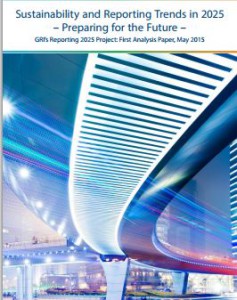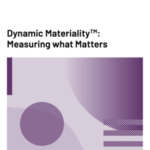
GRI, pioneer of the world’s most trusted and widely used sustainability reporting standards, has published the first Reporting 2025 analysis paper, Sustainability and Reporting Trends in 2025: Preparing for the Future. The paper examines future trends in sustainability and corporate reporting and disclosure. Following a series of thought-leadership interviews, the Reporting 2025 analysis highlights that new data technology will lead to greater transparency with reporting moving fully into the digital realm and occurring in real-time instead of annually. This is one of the many new insights into the future of sustainability reporting uncovered in today’s release.
“Although the practice of measuring and reporting sustainability performance has increased dramatically over the last decade, more needs to be done,” said GRI’s Chief Executive, Michael Meehan. “We’ve made great progress, but we need to adapt and enable the market to build better businesses and better policy. Together with the global GRI community, we are leading the way in exploring the next phase of sustainability reporting.”
 GRI’s Reporting 2025 facilitates an international discussion about the future of reporting with a cross-industry Corporate Leadership Group working to further explore the trends identified by the core team. The analysis paper is based on the first set of Reporting 2025 interviews and examines the key trends that businesses will need to focus on in the next decade, in order to transition to a more sustainable economy. Another prediction is that stakeholders will have more access to data, which will require organizations to align real-time decision-making processes with their communication on issues such as climate change and human rights. Increasingly empowered stakeholders, who will become more involved in governance and business strategy, will spur on these developments
GRI’s Reporting 2025 facilitates an international discussion about the future of reporting with a cross-industry Corporate Leadership Group working to further explore the trends identified by the core team. The analysis paper is based on the first set of Reporting 2025 interviews and examines the key trends that businesses will need to focus on in the next decade, in order to transition to a more sustainable economy. Another prediction is that stakeholders will have more access to data, which will require organizations to align real-time decision-making processes with their communication on issues such as climate change and human rights. Increasingly empowered stakeholders, who will become more involved in governance and business strategy, will spur on these developments
“At the beginning of the Reporting 2025 project, it was clear that two elements were needed to make measuring and reporting effective tools to promote change: focus and strategy. The release of the G4 Guidelines in 2013 was a major step forward in terms of making reporting more focused, but the question of how the practice should develop in the future remained unanswered,” said GRI’s Chief Advisor on Innovation in Reporting, Nelmara Arbex. “This paper summarizes the beginning of our exploration and highlights a number of critical topics for further discussion in the next phase of the project.”
GRI’s Reporting 2025 project is sponsored by Boston College Center for Corporate Citizenship, Enel and SAP. You can download a copy of the first Reporting 2025 analysis paper here. For more information on GRI’s Corporate Leadership Group on Reporting 2025 please click here.



